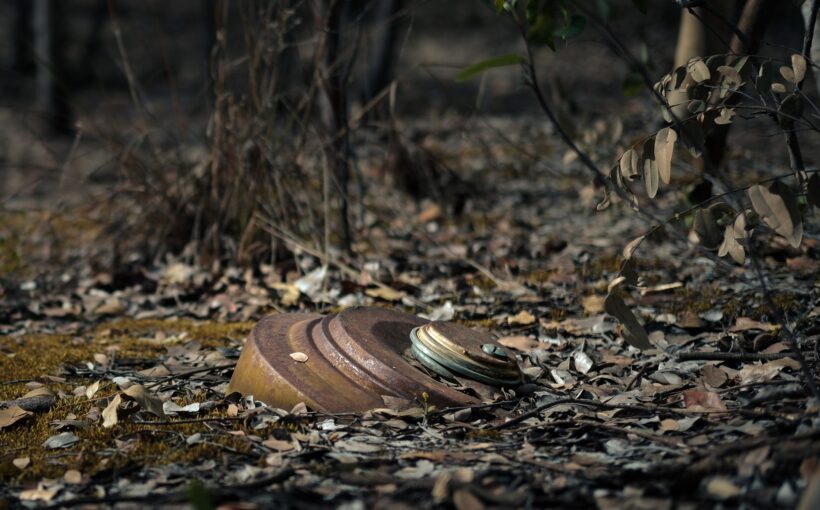| SNEAK PEEK |
— EU leaders could approve a further €500 million payment to cover military aid to Ukraine at their summit on October 26 and 27.
— A small group of U.S. senators want Defense Secretary Loyd Austin to dispatch unused Iron Dome batteries to Israel.
— France is including Germany and Spain in its Pegasse 24 air force exercise.
Good morning and welcome to Morning Defense.
| DRIVING THE DAY |
EU MULLS FRESH UKRAINE CASH: EU leaders hope to approve a further €500 million in military aid for Ukraine under the European Peace Facility (EPF) at their summit this month, draft conclusions obtained by our Giorgio Leali indicate. The preliminary draft includes a bracketed reference to the “possible adoption” of the eighth tranche of assistance under the EPF. That off-budget cash is used to partially repay European countries for exporting arms to Ukraine.
Hungarian block: Hungary’s Prime Minister Viktor Orbán stopped the new EPF payment to get Kyiv to remove Budapest-based OTP bank from a list of war sponsors. The Ukrainians duly dropped OTP at the end of September.
Penciled in: Still, the €500 million payment is in brackets, meaning it hasn’t yet been settled; diplomats will go through the draft again today.
Missing €20 billion? The draft doesn’t mention €20 billion in fresh cash through another fund within the EPF. As exclusively reported by us in the summer, that was suggested by some countries as a way of providing significant support over four years to Kyiv.
 |
| AGENDA |
MIDDLE EAST: The International Institute for Strategic Studies holds a webinar at 1 p.m. today on the conflict between Hamas and Israel, including ex-POLITICO correspondent Rym Momtaz.
** A message from ASD: The core mission of the European defence industry is to support our armed forces. To accomplish this mission, our industry must be able to perform four key functions: deliver, improve, react and challenge. Find out more in our ASD Paper.**
| NATO |
NATO STEPS UP FOR ISRAEL: Israeli Defense Minister Yoav Gallant joined the second day of NATO defense ministers meeting via video, and showed graphic footage of the horror of the Hamas attack.
Military support: The U.K. will send its forces to “support” Israel — including P8 aircraft, two Royal Navy ships, three Merlin helicopters and a company of Royal Marines to “track threats to regional stability such as the transfer of weapons to terrorist groups.”
Germany too: Germany confirmed earlier reports that it will hand over use of two multi-role Heron drones leased by the Bundeswehr from the Israel Defense Forces. He also said Israel asked for “substantial” medical supplies, adding that “we will now take care of that very quickly.”
NATO’S NEW RAPID RESPONSE FORCE: German Defense Minister Boris Pistorius pledged 35,000 troops to NATO’s new deterrence force on Thursday, aimed at keeping 300,000 troops in a state of high readiness.
SWEDEN DEAL STANDS: NATO Secretary-General Jens Stoltenberg said Turkey insists it “stands by the agreement” reached at July’s Vilnius leaders summit to approve Sweden’s membership bid, adding he expects a “speedy ratification.”
BIRTHDAY PARTY: Next year’s leaders’ summit will be the 75th anniversary for “this great alliance,” said U.S. Defense Secretary Loyd Austin.
**POLITICO’s Power Play podcast unveils the world of policy, politics, and power, with just a play button. Dive into the ideas driving the trends of tomorrow with exclusive interviews hosted by award-winning journalist Anne McElvoy.
| UKRAINE |
GERMANY PLEDGES €1 BILLION IN AID TO KYIV: Ukrainian Defense Minister Rustem Umerov thanked Germany for a €1 billion aid package that includes air defenses and 10 Leopard 1 tanks, and for beefing up defense-industrial cooperation between the two countries.
MORE KIT: Countries from the British-led International Fund for Ukraine said they would deliver a £100 million aid package to Ukraine that includes tracks and engines for armored vehicles and other technical gear. The contributions are funded by the U.K., Norway, the Netherlands, Denmark, Sweden, Lithuania, and Iceland.
SPANISH HAWKS TO UKRAINE: In case you missed it, the Spanish ministry of defense pledged six HAWK anti-aircraft missile launchers to Ukraine. Though a Cold War-era design, the HAWK system would augment Ukraine’s air defense umbrella ahead of the anticipated Russian strike campaign against critical civilian infrastructure this winter.
Spanish training and more ammunition: The ministry also announced that “the associated training of Ukrainian HAWK operators and maintainers will be provided in Spain starting next month” in response to a specific request from the US. The ministry also promised further 155mm and 105mm artillery ammunition and a shipment of heavy machine guns for use against drones.
| AIR DEFENSE |
US SENATORS MAKE IRON DOME PUSH: Four U.S. senators want the Department of Defense to dispatch two unused Iron Dome air defense batteries to Israel to beef up its air defense against Hamas rocket attacks. That spells trouble for a plan hatched by Democratic Senator Chris Van Hollen to send those to Poland as part of a complex swap that would then see Warsaw forward on its own Patriot air defense systems to Ukraine, our U.S. colleague Connor O”Brien reports. Israel is seeking to replenish its interceptors for the Iron Dome after rocket attacks by Hamas.
Send them now: “The transfer of these two Iron Dome batteries, in addition to sending other unused military assets, would bolster Israel’s defense capabilities and immediately help Israel combat terrorist aggression,” the four senators said in their Tuesday letter dated Tuesday, asking for a response from Defense Secretary Austin by today.
Missing domes? At the Association of the United States Army conference this week, top Army officials were circumspect about where the two U.S. Army Iron Dome batteries currently were stationed. General James Rainey, head of Army Futures Command, told reporters they were in the Pacific. In January, it was announced the batteries were at a base in Washington State, but the Army has said little since then about their location.
| FRANCE |
FRANCE’S PEGASE 24 EXERCISE WILL INCLUDE GERMANY, SPAIN: That’s what the French Air and Space Force chief, General Stéphane Mille, told reporters on Thursday, speaking at the Évreux air base in front of a Rafale fighter jet, an A330 Multi Role Tanker Transport and a A400M transport aircraft — what the country’s air force calls the “Rafale/A330/MRTT triptych.” Here are some takeaways from Laura who spent the day there.
Indo-Pacific training: France holds yearly military exercises dubbed Pegase in the Indo-Pacific. Allies are invited to join next year’s maneuvers, which will revolve around shared logistics. “The deployment’s endpoint will be Australia,” General Mille said, adding he expects more countries to join. Last week, the French air force’s Major General Philippe Morales said the U.K. could also participate.
New strategy on very high altitude: An incident with a Chinese spy balloon over the U.S. earlier this year has focused attention on the need to protect very high altitude airspace, which combines the challenges of air and space, Mille said during his opening speech in Évreux. “Operating in very high altitude foreshadows a continuum of air and space activity that we must master.” He aims to present a new strategy to the chief of defense staff.
DEFENSE COMMITTEE LISTS PRIORITIES: Cédric Perrin, newly-appointed chair of the Senate’s foreign affairs and defense committee, told reporters that the Senate will focus on the 2024 defense budget. “We managed to add a certain number of things into the military programing law, and we want to make sure they are applied.”
Drone development wars: Perrin said a priority will be continuing to monitor the development of the European Medium Altitude Long Endurance Remotely Piloted Aircraft System (MALE RPAS), or Eurodrone — currently being developed by Dassault Aviation, Airbus and Leonardo for France, Germany, Italy and Spain. But he’s not closing the door on the Aarok, a new combat drone developed by Turgis & Gaillard. “It’s a great project that will now have to prove itself,” he said. That echoes the view of Armed Forces Minister Sébastien Lecornu.
Joint tank project: Perrin backed the MGCS — the Franco-German future battle tank — arguing that industrial costs are so high that there’s no choice but to forge partnerships. However, France should seek to diversify alliances, especially now that Paris “has currently become one partner among many” for Berlin, he added. “I strongly believe deeply in the relationship between France and Germany, but I also believe in the relationship between France and Italy, between France and the U.K.,” the senator told reporters.
Save the date: The defense committees of the French parliament’s two chambers will travel to Berlin on November 6 to meet with the Bundesrat and the Bundestag.
QUICK HIT: Lecornu and his Indian counterpart Rajnath Singh discussed industrial cooperation on Wednesday.
| NOTABLE AND QUOTABLE |
On the topic of damage to the Finnish-Estonian gas pipeline, NATO Secretary-General Jens Stoltenberg said at the close of the NATO ministerial that “this has been an issue which has been high on the NATO agenda.”
But, he said private companies would have to “help us with surveillance and gathering information” to protect such assets considering the difficulty in monitoring such projects that span many hundreds of kilometers.
THANKS TO: Jan Cienski and Zoya Sheftalovich.
**A message from ASD: A strong European defence industry is paramount to ensure Europe’s freedom to decide and to act. To make industry fit for the new security environment, European policies should therefore focus on the following priorities: 1) Build and sustain the industrial capacity to rapidly ramp up production when needed; 2) Develop the next generation of capabilities to ensure European armed forces’ technological superiority; 3) Reduce critical dependencies for technologies, components and raw materials and enhance resilience of defence supply chains; and 4) Ensure adequate and enduring public funding and facilitate access to private finance.**





